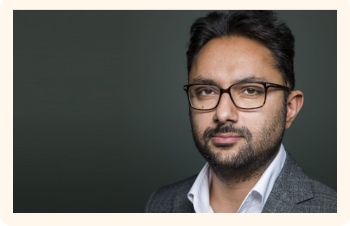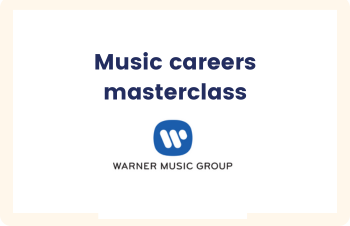
The global title read by presidents and entrepreneurs, the Financial Times hosted the last Creative Access masterclass of the year at its London offices yesterday. Likeminded individuals, hungry to learn about the world of journalism, gathered to hear from our esteemed panel spanning editorial, diversity and inclusion, photography, and technology.
John Kundert, chief product and technology officer, welcomed our audience, speaking of the Financial Times’ mission to “hold power to account” and his appreciation of working for a company where he can bring his real, authentic self to work every day. This was a theme that reoccurred many times during our masterclass, leaving us with the takeaway that our unique experiences can often be the key to being noticed.
When asked for their top tips on making the often-difficult step into journalism, our panel had lots to share. Nikou Asgari, who joined the Financial Times as an intern in 2018 via Creative Access after studying economics, advised getting as much experience as possible for portfolios. This might involve volunteering for smaller local newspapers or joining your university club but “if you want to be a journalist, do the journalism”.
“Rejection is hard, but you have to learn from it”
Murad Ahmed, technology news editor, spoke of post-graduate degrees and training, especially legal training, as saying the wrong thing can land you in hot water in journalism. He added that these qualifications often add a degree of seriousness, rather than writing just being an interest. If this isn’t feasible, smaller, more accessible steps might be taking a closer look at your Linkedin and making improvements there. Yasir Mirza, head of diversity and inclusion at the FT, said “connect with those in places you’d like to be in”. If you’re not sure where to begin with making your LinkedIn profile stand out, we’ve written a blog post on the best way to get ahead.
And what if you have experience, as well as a strong LinkedIn profile, but you’re still dealing with lots of rejections? Our panel sympathised. Esan Swan, Creative Access alum and now picture editor at the FT, admitted to taking a hiatus from applications, before returning with a clearer head and renewed energy. “Sometimes you need a break” he said. It can be gruelling to hear no’s, but it’s part of the process, and it’s important to make sure you don’t take it personally. Abbie Scott, our chair and deputy managing editor at FT, revealed that after being involved in Nikou’s interview process, she was one of 1400 applicants for the role. Competition is tough – but if you are often not getting to the interview stage, there are a few things you can do to increase your chances.
Murad and Abbie spoke of countless times where candidates had clearly not done their research on the newspaper, or even worse – mistakenly referred competitor newspapers in applications instead. Vital advice would be to triple check your cover letter and CV, as well as making sure each one is personalised to the role you are applying for, as sometimes it can be obvious when someone has used one for several roles. The message here is that although rejection is difficult, it’s important to recognise that with each no, you’re closer to cracking the formula.
Nikou Asgari“As long as you learn from it, you’ll grow and be able to move forward.”

Part of that formula, is the word that many fear and even one that CEOs often admit they don’t enjoy… Networking. As someone who utilised going for a coffee with experienced peers and reaching out to those he admired on LinkedIn, Murad believes in the significance in paying it forward. “Use the people who believe in you”, Abbie continued. Think not just about connecting with those above you, but with your peers, who might also be struggling with networking.
For those who find it particularly difficult, Yasir shared his personal experience. As an introvert, he found himself dreading having to go to events and introduce himself. “Go with a specific ask” he advised our audience, “have 1-2 people you need to speak to, and once you’ve done that, feel free to get out!”. Esan added that it doesn’t always have to be a serious big thing; it can be as simple as asking someone for a quick coffee, or a virtual call. Creating these simple targets for yourself can make a nerve-wracking task a lot easier to get through, and can also give you a sense of achievement for completing them. With practise, networking does get easier.
The art of failing, and how it can lead to success
Our audience was eager to know about any mistakes our panel made, and how they learnt from them, and this question provoked lots of interesting responses. Esan warned us to make sure we do our research, brush up on your knowledge of the details used by a newspaper, how they edit, and “take risks, do things you’re not always sure about”. The panel all agreed on the benefit of proactivity. You are the best person to prioritise your career, and you must be striving to know more, on a journey to satisfy a curious mind, Yasir added.
Abbie Scott“Be ready to tell people what you want”
Murad told us not to “tell yourself you’re lucky to be anywhere” tell yourself, “I got here on merit and worked hard”. Often, coming from an underrepresented background can provoke feelings of imposter syndrome, and a lack of confidence in your abilities, but Murad is a testament to the power we hold when we simply believe in ourselves.
You are in charge of your career. To make your first steps, think about not only what you want, but how you want to get there, and who can help. Being your authentic self is just one component of this formula, but after last night, we’ve learnt that it’s in fact, the most important one.
We’d like to extend a special thanks to the team at the Financial Times, and our varied and experienced panel for their time. Please keep an eye out for our next masterclass in January 2023, and if you missed this one, the recordings are available to watch here.




